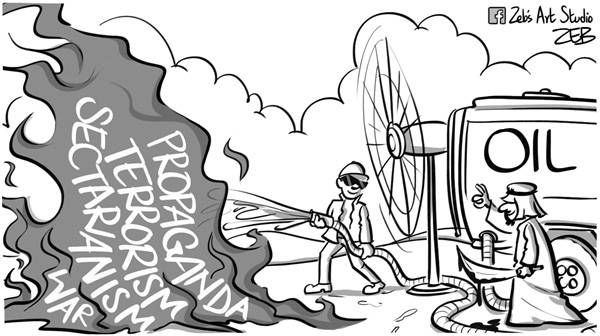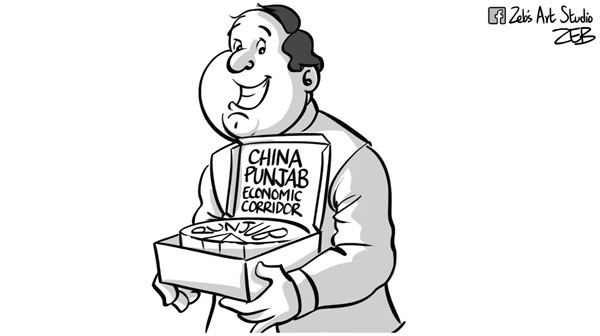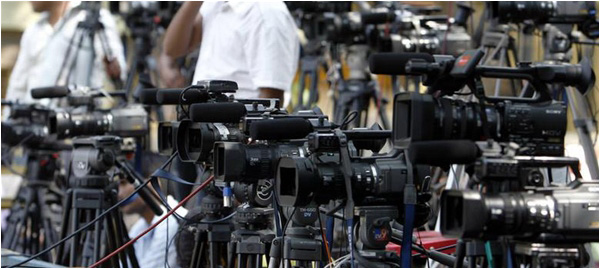
Calm them down
Sir,
Relations between Riyadh and Tehran have been tense ever since the Islamic Republic of Iran was established as a result of the Iranian Revolution of 1979. In recent time, religious competition between the Islamic world’s Shia and Sunni powerhouses has turned into a burgeoning geopolitical rivalry. But Saudi Arabia’s recent decision to execute prominent Shia cleric Sheikh Nimr Al-Nimr has brought Saudi-Iranian relations to their lowest. The two Middle Eastern giants are raising the level of hostilities between them at considerable risk to peace in the region. Because of the Iranian and Saudi tussle, the whole region is now looking divided on sectarian lines. Saudi Arabia severed all diplomatic relations with Iran. Saudi allies Bahrain, Sudan and Djibouti quickly followed the same. Other Gulf Cooperation Council (GCC) allies like Kuwait, Qatar and the United Arab Emirates opted for the less drastic measure of recalling their ambassadors. On the other hand, the Shia camp has also reacted very sharply. Hezbollah issued a statement calling al-Nirm’s execution an “assassination” and an “ugly crime”. In Tehran, hardliners stormed the Saudi embassy, which is against universally agreed-upon rules of foreign relations safeguarding diplomatic missions. But all these developments are just the start of a major conflict that is about to start in the region.
The struggle between Riyadh and Tehran for political and religious influence has geopolitical implications that extend far beyond the placid waters of the Gulf and encompass nearly every major conflict zone in the Middle East. A diplomatic rupture between the major Sunni and Shia powers in the region will resonate across the Middle East, where they back opposing sides in many destructive wars and simmering conflicts. The first casualty was the collapsed ceasefire between Houthi rebels and Saudis. The next one will probably be the planned UN-led conference in Vienna to negotiate a political settlement between the warring parties in Syria, which is not wholeheartedly supported by Saudi Arabia anyway. Moreover, more unrest can be expected in Iraq, Lebanon and even Bahrain because of the recent Saudi and Iran tussle. Now in such a supercharged atmosphere, the moderate middle ground has been sorely weakened and advocates of a hardliner approach to regional affairs now hold sway. Some analysts believe that Saudi Arabia may be deliberately fanning the flames of war in its region in a bid to sabotage the agreement between Iranians and the international community led by the United Nations Security Council permanent members plus Germany. But Iran also didn’t respond in the whole episode maturely.
Some effective and immediate steps should be taken by the international community and the United Nations to calm down the boiling equation between the Saudis and Iranians. First of all, the January 25 international conference in Geneva that seeks a diplomatic solution to Syria’s civil war should be postponed in order to give Saudi Arabia and Iran a calming period. Secondly, the United States should reassure Saudi Arabia that they are not in going in favour of Iran at its cost so that Saudis remain calm and don’t feel insecure. Finally, the United Nations should send its envoy to both Riyadh and Tehran to convince the Saudis and Iranians to de-escalate the situation. We have to understand that it is very important to have cooperation between the Saudis and Iran as they are two major powers in West Asia. Moreover, this conflict between Saudis and Iranians will also complicate the fight against ISIS in the sense that ISIS will take the opportunity to exploit two regional powers going after each other rather than going after it.
Manish Rai,
Mumbai.

Private schools in sad state
Sir,
It is disillusioning to see the worsening state of educational institutes in Pakistan; especially private schools, with regards to provision of employees’ rights and benefits. The concept of work ethics and work-life balance is indeed proving to be a theoretical concept, which is least applicable in private schools here. The teachers working in private schools are not paid commensurate with their qualifications and experience, as well as effort and time invested in their jobs.
In addition, the health and wellbeing of teachers at private schools seem to be neglected by the upper management. The execution of the work is deemed to be more essential than the health and wellbeing of teachers. It is indeed inhuman to see that teachers are overburdened with intense work; and are not even compensated by adequate extrinsic and intrinsic incentives. There exists a massive discrimination in provision of rewards and benefits to the head and management, and the teachers in private schools.
The question, which needs to be addressed, is that are teachers merely deemed to be work machines at schools? Is the philosophy of a work-life balance, employee motivational strategies and work ethics merely confined to books of management? Do not they have practical real-life implications?
It is indeed inevitable to address the serious anomalies existing in private schools in Pakistan, regarding inequitable distribution of resources between management and teachers, and poor employee motivational programmes. There should be a stringent mechanism to monitor and evaluate the provision of rewards and benefits to teachers, who are the backbone of the educational sector.
Aiyza Javaid,
Lahore.
Target killing
Sir,
Bilawal Bhutto, while addressing a public gathering in connection with the eight death (murder) anniversary of his mother, termed the present ongoing National Action Plan as “victimisation of political opponents” and called it a continuation of the decades-old “target killing” of PPP. It’s a matter of great disappointment that we as a nation have failed to learn any lesson from our past history and narratives, and people in minorities or smaller provinces have been forced to feel what Bilawal said. The separation of East Pakistan must have opened the eyes of our leaders in power, but we see that even such a “great tragedy” didn’t make any difference nor did it change the biased thinking of the ruling class towards smaller provinces, which forced the leader of one of the major political parties to denounce and condemn the “target killing” of his party. Going through the blood strained history of present days, Pakistan, we all fathom and understand how the most charismatic and able leader of the third word was subjected to a “judicial murder” and was made a “horrific example”, and how the reference in this regard is pending before the honorable Supreme Court of Pakistan. The Pakistan People’s Party, having its roots in all four provinces of the country, was subjected to all sorts of hurdles and obstructions to block its entry to the corridors of power, sometimes in the form of the IJI, sometimes in the shape of “operation midnight jackal”, and when these foul and nasty plans and tactics failed, its leadership was removed from the power on false, inaccurate and unsound charges of corruption, which were never proved in a court of law. A very large population of Pakistan was made to believe ZAB was wholely and solely responsible for the separation of East Pakistan.
When BB was the prime minster of the country and tried to settle issues with India and met her Indian counterpart, she was called a “security risk”. The PPP and its leaders are not the only ones who were subjected to “target killings”. Bacha Khan, Wali khan, Ajmal Khataq, GM Syed, Akber Bugti and so many from smaller provinces, at one time or another, were called traitors, agents of enemies and subjected to treason charges in some cases. What Bilawal has said, it carries a lot of weight with historical backgrounds; now is the time that the grievances or the misunderstandings prevailing in the hearts and minds of smaller provinces or minorities must be addressed with a true patriotic sprit and all federating units must be taken onboard to remove the feelings of “target killings”. The accountability or any National Action Plan must be implemented in the true national sprit without creating an impression that such a plan is specific for any part or province or community.
Aamir Aqil,
Lahore.

Pakistani media jingoism
Sir,
These armchair defense analysts, who having retired after gainful employment, oppose every sensible political move by civilian executive to normalise already strained relationship with India, forget that the Soviet Union with its stockpile of nuclear weapons and armaments collapsed because their economics could not sustain their fire power, nor feed their population.
Kashmir crisis could have been resolved in 1948 if only our military officers had chosen to obey lawful command of Quaid-e-Azam, instead of listening to British commanding officer. Thereafter, our senseless pursuit of strategic depth, a concept created by an overambitious establishment, blinded by greed for power and desire to rule Pakistan through power of bullet, has made this country very insecure. A lot has been lost since then and for that it is collective failure of both our civil and khaki establishment, which course has to be reset with sanity and realism, keeping our vital national interests in view.
I fail to understand this hype over Modi’s visit, when in past Ziaul Haq went uninvited to India to prevent war, while Musharraf after his senseless Kargil fiasco went out of his way to shake hands with Vajpayee in Kathmandu and his foreign minister is on record that Kashmir LOC was being almost accepted as permanent border without consultation with Kashmiri representatives.
If only the Pakistani leadership were to ensure rule of law and that those at helm dare not have any conflicts of interest, this country would never have got involved in other people’s war, as they did in Afghan conflict, forfeiting our territorial sovereignty and giving refuge to foreign armed militants, who today have turned on us with a vengeance. While I agree that PM Nawaz must ensure that his sons with their vast investments abroad must not be involved with dialogue process with India, nor should they accompany him on his foreign trips to ensure there are no conflicts of interest, he has every legitimate right to take steps to restart dialogue process with India to normalise relations and avert being in continuous state of tensions.
If we cannot be best of friends we must learn to live with each other, respecting our individual territorial sovereignty. Kashmir is a burning issue, which will take time and a lot of effort and goodwill on both sides.
Malik T Ali,
Lahore.

Antics of white-collar criminals
Sir,
When holding important state assignments, some politicians, bureaucrats and khakis indulge in white-collar crimes, robbing the state and individuals of billions, which are siphoned out of the country in smart operations, hoodwinking elaborate anti-money laundering international networks and financial regulators within the country. The moment any criminal prosecution is started against these smart white-collar crooks, their lawyers and doctors fake sicknesses, mental depressions and cardio-related problems.
In Pakistan, almost 70% of the population is above the age of 55 years, suffering from some medical ailment, which does not hamper their busy daily work schedules. However, the moment any investigation is launched all ailments surface and their severity becomes more audible and played up by media spin doctors, in an attempt to portray criminals as victims. We have seen this phenomenon in the case of Musharraf, Asif Zardari, Dr Asim, Tauqir and even Ayaan Ali, the money laundering model, part of an organised gang involved in institutionalised flight of capital.
What their patrons forget is that their conning activities have deprived the state of billions, which could have been invested in building infrastructure for health, education, the provision of basic necessities and maintaining law and order, causing untold miseries to millions. The financial robberies they commit are crimes against the state, with disastrous consequences upon the lives of the most deprived sections of our society.
Ali Tariq,
Lahore.
TAPI pipeline project
Sir,
December 14, 2015 saw the formal launching of the historic Turkmenistan-Afghanistan-Pakistan-India (TAPI) pipeline project, the largest ever gas pipeline project in the region. The ground-breaking ceremony of this gigantic multilateral project was held in Turkmenistan’s Mary city, considered to be the fourth largest industrial city of the Central Asian state. None but Pakistan’s Prime Minister Nawaz Sharif joined the regional leaders to formally launch the work on the TAPI pipeline project.
It is being said that the project, if successfully executed, will prove to be a game-changer for the entire region, as it would help boost the economic development of not only the project partner countries, but also other countries of the region. Apart from this, the $10 billion pipeline project will create substantial employment opportunities particularly in countries, which are key stakeholders in this joint venture.
As reported in the media, roughly 3.3 billion cubic feet gas would be pumped through the pipeline. Pakistan’s share is expected to be 1.3 billion cubic feet. The same amount would perhaps be taken by India. Factually speaking, Turkmenistan is heavily dependent on China for a large volume of its gas sales. After the completion of the TAPI gas pipeline project, Turkmenistan will have the opportunity to expand its exports significantly. Besides this, the gigantic TAPI project is expected to relocate resources from Central Asian Republics (CARs) to Afghanistan, Pakistan and also to India.
M Fazal Elahi,
Islamabad.

Interesting times ahead
Sir,
A lot of celebrations, fun and cheers witnessed the dawn of 2016 across the world. Parties and functions were arranged with great zeal and zest, novel promises were made, new resolutions were moved with the hope that a miracle will happen and all sorrows and sufferings will be ended throughout Pakistan. The preceding year ended with the grim reminder of the APS attack. The foregoing year gives us nothing other than cries and screaming of the heirs of the deceased of various tragic terrorist accidents. No admirable improvement was observed in respect of corruption, nepotism, unemployment, poverty, inflation, good governance, energy shortage, water crises and the deteriorating situation of law and order at a domestic level. On the other hand, the economy witnessed a slight rise, but with the worsening condition of our currency.
On the external front, 2015 proved very uneven, Pak-Afghan and Indo-Pak relations remained twisted throughout the year, with a happy ending at least as far as India is concerned. The triangle peaceful relationship between these three countries is essential for peace in Asia and the world.
In 2016, as per tall promises made by the ruling elite, we, the public, expect a change in the existing dubious governance attitude. The only progression that could be observed, so far, the army’s role in reducing terrorism in FATA and Ranger’s operation in Karachi. Investor and traders are feeling safe in the industrial hub of Pakistan and surely this will strengthen our economy. The inflation rate is decreasing, mainly due to low prices of petroleum in the international market and this proved a sign of relief for the general public. At the end, things are on the right track, and it can be hoped that 2016 will be a year free from corruption, terrorism and other tribulations.
Muhammad Waqas Haral,
Chiniot.

